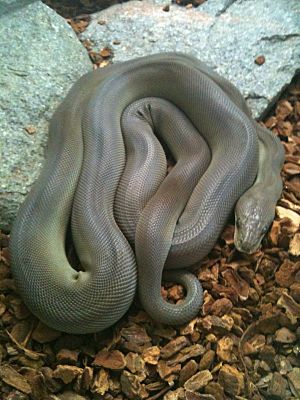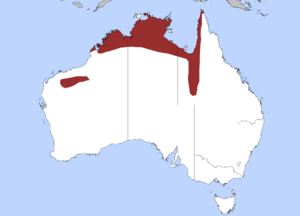Olive python facts for kids
Quick facts for kids Olive python |
|
|---|---|
 |
|
| Conservation status | |
| Scientific classification |
|
| Kingdom: | Animalia |
| Phylum: | Chordata |
| Class: | Reptilia |
| Order: | Squamata |
| Suborder: | Serpentes |
| Family: | Pythonidae |
| Genus: | Liasis |
| Species: |
L. olivaceus
|
| Binomial name | |
| Liasis olivaceus Gray, 1842
|
|
 |
|
| Distribution of the olive python | |
| Script error: The function "autoWithCaption" does not exist. | |
| Synonyms | |
|
|
Script error: No such module "Check for conflicting parameters".
The olive python (scientific name: Liasis olivaceus) is a type of snake that belongs to the python family. This amazing snake lives only in Australia. It is known for its smooth skin and large size. There are two main types, or subspecies, of the olive python.
Contents
What Does the Olive Python Look Like?
The olive python is Australia's second-largest snake. It can grow to be over 4 meters (about 13 feet) long! Its skin looks very smooth because it has many rows of scales on its back.
The snake's color can be chocolate brown or olive green. Its belly is usually a creamy white color. Sometimes, people confuse the olive python with the king brown snake. The king brown snake is venomous, but the olive python is not. Because of this mix-up, olive pythons are sometimes sadly killed by mistake.
Where Does the Olive Python Live?
You can find the olive python in several parts of Australia. It lives in Western Australia, the Northern Territory, and Queensland.
These snakes love rocky areas and deep valleys called gorges. They especially like places near water, like rivers or waterholes. For shelter, they often hide in caves or cracks in rocks. They can also be found in hollow logs or burrows under rocks.
What Does the Olive Python Eat?
The olive python eats different kinds of animals. Its diet includes birds, mammals, and even other reptiles. Some of its favorite meals are rock-wallabies, fruit bats, ducks, and spinifex pigeons.
This snake is a clever hunter. It often waits quietly next to an animal trail. When prey comes by, it ambushes them! The olive python is also a strong swimmer. It can hunt in waterholes, striking at animals from under the water. It has even been known to eat monitor lizards and small crocodiles.
Reproduction and Life Cycle
Olive pythons start looking for mates in May. This mating season lasts until mid-July. If a female snake becomes pregnant, she carries her eggs for about 81 to 85 days.
In late spring, the female python lays her eggs. She usually lays between 12 and 40 eggs. On average, a female will lay about 19 eggs at a time. The baby snakes hatch after about 50 days. Each new hatchling is about 35 centimeters (14 inches) long.
Types of Olive Pythons
There are two main types of olive pythons. They are found in different parts of Australia.
| Subspecies | Scientist Who Named It | Common Name | Where It Lives |
|---|---|---|---|
| L. o. barroni | L.A. Smith, 1981 | Pilbara olive python | Australia in the Pilbara region of Western Australia |
| L. o. olivaceus | Gray, 1842 | Olive python | Australia from the Kimberley region in Western Australia to the area around Mount Isa in Queensland |
Olive Pythons as Pets
Some people keep olive pythons as pets. They are even bred in captivity. However, these snakes are considered an advanced pet. This is because they grow very large and need a lot of space. A terrarium for an adult olive python should be at least 2.4 meters (8 feet) long, 0.9 meters (3 feet) high, and 0.9 meters (3 feet) wide.
Even though they are big, olive pythons can be friendly and calm if they are raised well. When taking them out of their enclosure, it's often suggested to use special snake hooks. This helps prevent the snake from thinking it's feeding time. Once out, they are usually very gentle and can be handled calmly.
Images for kids
See also
 In Spanish: Liasis olivaceus para niños
In Spanish: Liasis olivaceus para niños
 | Mary Eliza Mahoney |
 | Susie King Taylor |
 | Ida Gray |
 | Eliza Ann Grier |



